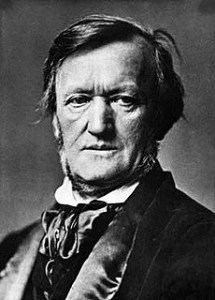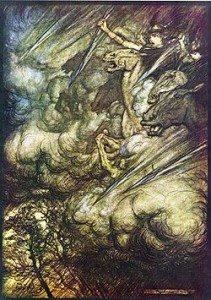 Books could be written, and probably have been, about the likely hundreds of uses of Richard Wagner‘s music in movies. People have to write books about something.
Books could be written, and probably have been, about the likely hundreds of uses of Richard Wagner‘s music in movies. People have to write books about something.
(Okay, I looked it up on the web, it’s not as many as I expected, but I bet what I found wasn’t a comprehensive list.)
There are plenty of reasons for the composer’s popularity among filmmakers, chiefly, I expect, the dramatic usefulness of Wagner’s style—which was deliberately intended to enhance the drama of a story above all else. This was a move away from the exultation of the voice that had characterized grand opera. Wagner wrote essays about his approach, championing his predecessor Beethoven’s concept of the unending melody, and pushing that concept to new heights. Themes ebb and flow in Wagner’s music, but nothing ever really repeats. It moves forward, like a shark, like time. It can be ugly, pretty, sad, triumphant, loud (often loud), whatever the demands of the story call for. This makes the music eminently plunderable for films. With 16+ hours of music in The Ring cycle alone, there’s something for every situation.
Often I recognize themes, as I grew up with Wagner’s music in my home. I know the most obvious passages pretty well. I have to say, most often when I catch a reference, it’s appropriate to the original subject matter, or at least there’s some link to be made. Most directors seem to understand that certain people in their audience will know what any classical music they use “means,” and that those are just the sort of people who expect some thematic consistency.
I don’t think I’m uptight about it, but I do like to know things other people don’t, and then be smug. So here are some instances where some directors really went to town on Wagner.
The Ride of the Valkyries
“The Ride of the Valkyries” is the first and probably only piece of music most people associate with Wagner, though there’s an even more famous piece that everyone knows even better without knowing it’s Wagner (bonus points for naming it). The bombastic piece is used ubiquitously at the flicks, including in classics like Rebel Without A Cause and Police Academy 5: Assignment: Miami Beach. Of course, many who hear this piece first think of Apocalypse Now.
This music is the triumphant song of the Valkyries, who are the nine daughters of Wotan, king of the gods. Think Odin, right? In the story the music tells, Wotan seduces the Earth goddess Erda, and sires these warrior virgins, who now ride around on flying horses, scooping dead soldiers up off the battlefield, and carrying them up to Valhalla to drink and be merry with Wotan. And they sing this song with their giant lungs: Hoy-yo-to-ho!
Scary enough to scatter the natives, for sure.
Looking at the piece’s use in Apocalypse Now, I’d say helicopters come pretty close to flying horses, and they even carry the wounded. And this is their war song. It works.
Tristan und Isolde
Recently, Melancholia came out, and it’s drenched in Wagner. Specifically, the beginning of Tristan und Isolde.
(Funny thing is, I haven’t actually watched more than five minutes of Melancholia. I will, it’s in my queue, but it’s gonna be some heavy shit for me. I just know it.)
But no matter, having seen just that much, along with the preview, the thematic connection is obvious to a Wagner fan. The music used in the beginning of the movie is the opening music of Tristan und Isolde, but for a more direct thematic connection, I look to the beginning of the third act. Tristan has been wounded. He flees to a remote island, where he and his servant await Isolde. While his man servant searches the seas for her ship, Tristan waits and bleeds. This is the music of the inevitable. Of the conscious awareness of one’s own end. But don’t worry about Tristan. He’s been dying to be dead ever since he drank a love potion with Isolde in Act I. All they can talk about is how much they want to die, please, so they can be together forever.
(Wagner is very German, if you hadn’t noticed.)
Anyway; Tristan will die in Isolde’s arms (just like Juliette). She will sing the most obvious musical orgasm since Prince’s “Come” (1999), called “The Liebestod” (literally, “love death”), then die of love. People do that in opera. It all works out for them, but more on that later.
In Melancholia, the world knows that an asteroid is going to hit the earth and extinguish all life. Kirsten Dunst gets married anyway, or something like that. And they play the saddest music in the world over and over. I’ll see it, I will. I haven’t yet because it’s Lars von Trier, and I can’t stand that guy. Not after Breaking the Waves; I felt physically ill after that film. Seasick, really. And Dancer in the Dark was amazing, but it still made me hate von Trier more. It made Bjork hate him, too.
Lars von Trier seems to me to rather despise his audience, and I’m sure I win by not playing along. But then he goes and makes this movie I have to see, because of the Wagner. Fuck off, Lars von Trier. Fuck off all over again. I’ll have to see it to find out if he uses that third act music. He’d better, it’s the saddest damn music in the world. I’m a little obsessed with it.
A little bit of a sidetrack from usage for narrative film is 1987’s Aria, which is a series of what are essentially music videos done to various famous arias, each by a different director. Franc Roddam’s take on “The Liebestod” hits the theme squarely on the head, with Leontyne Price singing Isolde’s aria over shots of a beautiful, young couple driving to, and then around downtown Las Vegas, enjoying the lights, having very naked, pretty sex in a cheap hotel room, and at that aching musical climax, slitting their wrists in the bathtub. They die in each other’s arms. Can’t argue with that, it’s a very literal interpretation, and fairly effective, emotionally. It also gives Bridget Fonda her film debut and to date, most believable and most naked performance. Not speaking at all really boosts her acting level dramatically. My opinion.
Siegfried
It’s been a while since I saw John Boorman’s Excalibur from way back in 1981, but I remember it being pretty much wall-to-wall Wagner. It starts with “Siegfried’s Funeral March” over the opening credits (hey, remember opening credits?), which is frankly some seriously badass credits music.
Thematically? Siegfried and King Arthur both wield swords no one else can and they both have exalted destinies, but not much else in common. Well, I mean, they’re both great heroes, and all, and they come from lowly circumstances.
Siegfried never really learns much, though, before he screws everything up. King Arthur does a fair piece better.
Boorman later uses the prelude to Parsifal, who is literally Percival of King Arthur myth, used by Wagner in his final opera. Boorman also uses the “Prelude to Tristan und Isolde.” The story to that opera is a dead ripoff of Lancelot and Guiniviere. Isolde is meant for King Mark. Tristan is King Mark’s best and most faithful soldier. Tristan and Isolde are drugged, fall into drunken love, and Tristan breaks his oath to his King. Same diff.
Das Rheingold
Terrence Malick’s The New World concerns the first ships to colonize America, John Smith, Pocohontas, and all that. For the beginning of the film, Malick chose the opening notes of Das Rheingold, the very first music of the four-opera-long Ring cycle, a lilting, undulating E flat.
In the opera, we’re bobbing around in the waters of the Rhein River, at the beginning of a very long story, if not the beginning of time. There will be a dwarf, and he’ll argue with some water nymphs and steal their gold—but first you’re just as still as a single note, then some lilting.
It’s great for opening credits, naturally.
Then we’re tossing and turning, at the edge of something. There’s a lot of hope in the music, a lot of expectation and exultation. In the film we see the ships first approaching the new land, and the natives run around, excited. Undulating chords become lashing waves, as the excited orchestra awakens the Rheinmaidens. The ships arrive and dock in the New World, full of expectation. It works great, very poetic. Malick is more poet than director, everybody says so.
See, I just said it.
Richard Wagner
As in, the man. Where in film can you find out about the man himself, I hear you cry. Where, indeed. The most fun portrayal by far that I know of will be a bit tricky to find.
Strike that! A quick web search reveals that Ken Russell’s mind-bender, Lisztomania, is finally available on DVD, only as of this September 6th, if you can believe that. So much for my coveted VHS copy that I actually paid money for. Fate has just intervened, and clearly, you must go buy/rent it today.
If you’ve ever thought The Who’s Roger Daltry should play 19th century Hungarian composer Franz Liszt, then do I have a film for you! Liszt was in many ways the first pop star, and as surreal as this film is, there’s more that’s historically accurate in it than the giant-penis dream sequence might lead you to believe. Real-life Liszt had a daughter, Cosima, who would become Richard Wagner’s bride and love of his life. Wagner did abuse the wealthy Liszt’s patronage, though whether he ever actually sucked blood out of Liszt’s neck while he played piano is unclear. Ken Russell seems to think so. Go watch it and tell me what it means, I dare you.
Also now available on DVD (since 2005 already, I had no idea) is Richard Burton’s penultimate film performance, in the title role of the 470-minute epic mini-series, Wagner. I have not seen it, thinking it was unavailable in this country, only because that was the case for years. It was made for the 100th anniversary of Wagner’s death in 1983, and while critics disagree about the quality of the film, there is a general consensus that it is very, very long. It is also filled with top-tier actors: John Gielgud, Laurence Olivier, Ralph Richardson, Vanessa Redgrave, for chrissakes. Certainly the film has its champions, no doubt mostly Wagnerites, who I can tell you first hand are a bunch of crazy people. Somebody buy it for me for Christmas, and I’ll let you know what I think.
The very first biopic of Wagner came out on the 100th anniversary of his birth, in 1913! This gives you an idea of just how close the man himself was to actually writing for movies. Had he but lived 30 more years. Apparently, the man portraying Wagner in that silent film, Giuseppe Becce, also wrote the musical score, as Wagner’s actual music was somehow too expensive. I’m not sure what this means, possibly it refers to the giant orchestras Wagner wrote for, but the irony of it is delightful.
There you have it, though if you’re wondering where What’s Opera, Doc? fits into all this, well, it’s pure genius, of course. For that Loony Toons production they actually used very little of the music of the Ring, which is what it visually and thematically presents (Spear and magic helmet!). Mostly, it’s Tristan und Isolde, and a bit of Tannhäuser. The bit with Bugs Bunny riding on that awesome fat horse with tiny legs, that’s from Tristan. And I think that’s a fine image to end on.
Oh, Brünnhilde, you’re so wuvwy!





While I don’t know much about Wagner I do think you have described Brigit Fonda perfectly. Time to watch Lisztomania!
Do we have to buy the damn thing? Netflix doesn’t carry Lisztomania, the bastards. A great double bill with it would be another Ken Russell movie, one I saw at the Castro last year, The Music Lovers, about Tchaikovsky. It is insane.
Maybe we can rent it at Lost Weekend? They certainly must have a copy.
Bah. Lost Weekend only has a VHS copy. I put in a request for the DVD though.
Greencine has it. It lurks in my queue.
Is this a Wagner score? I saw it on Wonkette, which pointed out its Leni Riefenstahl creepiness.
http://www.youtube.com/watch?v=p7D0d7ztLY0
I’m not the Wagner expert by a longshot but I’d say it’s more likely a Hans Zimmer score.
Yeah, Hans Zimmer sounds about right. It’s modern. For something Wagner wrote that influenced this sort of thing, try the opening of Die Walkure:
https://www.youtube.com/watch?v=qWU09ASAV0w
And this is the tip of the iceberg, if one thinks about Wagner’s overall influence on cinema… both in terms of music and the medium itself. There’s a book that came out just a few years ago from Indiana University Press called “Wagner and Cinema” (eds. Jeongwon Joe and Sander L. Gilman), which I hope to read as time allows: http://www.iupress.indiana.edu/product_info.php?products_id=133382
Here’s another effective usage of the opening from Das Rheingold, from Werner Herzog’s Nosferatu:
http://www.youtube.com/watch?v=H2w8Fhs64Zo
Nice, Jason. Herzog always knows what he’s doing.
Okay, check out this music and its similarity to the opening of Superman, with that floating chord, and a single horn starting the theme? Check it here, at 43 seconds in:
https://www.youtube.com/watch?v=Ot2aUen36C0&feature=fvwrel
The web site you referred to for a listing of films using Wagner’s music is indeed far from comprehensive. Apart from the fact that they had to stretch it by including a few of the probably hundreds of films that use “Treulich geführt” as Gebrauchsmusik, there are some very important omissions of major films from the forties that use Wagner music in unusual ways. “Humoresque” ends with Joan Crawford walking into the sea to the Liebestod (well, that’s not that unusual); in “People Will Talk”, whose most important musical quote is Brahms’ Academic Festival Overture being rehearsed and conducted by Cary Grant (with his friend Walter Slezak, who was the son of the great tenor Leo Slezak, playing bass), there is a significant scene in which the Preislied from Die Meistersinger is being played on the radio while the characters ruminate on the power of music; and in Preston Sturges’ wonderful “Unfaithfully Yours”, Rex Harrison playing a Beecham-inspired character conducts the Tannhäuser overture (and two other pieces) while imagining hyper-romantic ways of dealing with his wife Linda Darnell whom he believes to have been cheating on him.
I would bet, however, that for every movie of the 30s and 40s
(when appropriation of classical music for film scores was at its height) using Wagner’s music (other than the wedding march), there are about ten using Tchaikovsky’s. So go figure.
Pingback: Wagner at the Movies | Steve Sokolow·